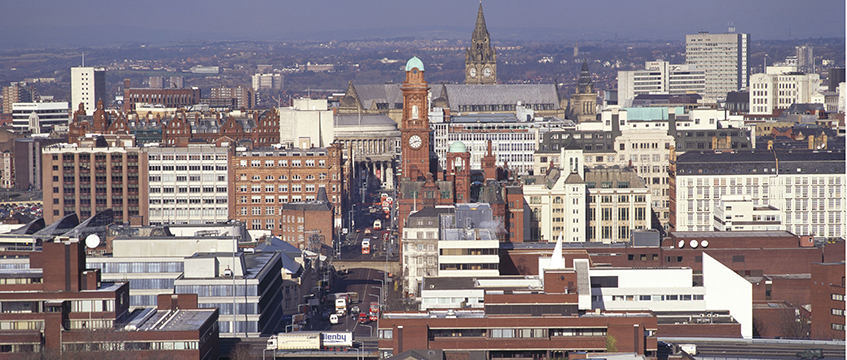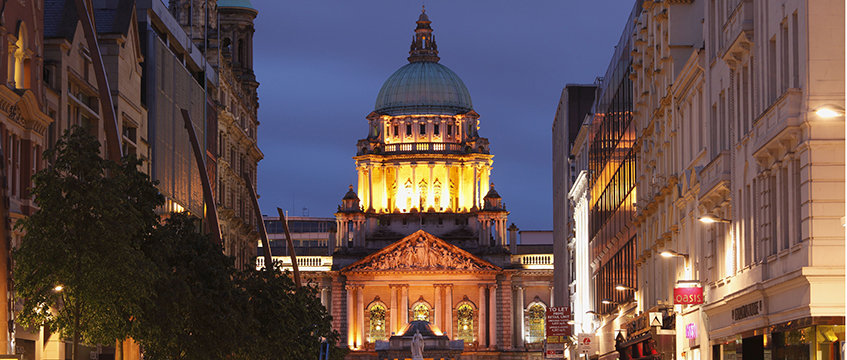Key UK regional cities have reported record levels of construction activity as residential development outside London surges, according to the latest Deloitte Real Estate Regional Crane Survey.
The number of residential schemes under construction grew in 2017 in each of the cities in the report – Manchester, Birmingham, Leeds and Belfast.
| Manchester | Leeds | Belfast | Birmingham |
Manchester, the largest market, reported more than 11,000 homes under construction – a 60% rise, year-on-year.
However, Leeds had a particularly strong year with 1,586 homes under construction across five development sites – more than double 2016’s 619.
Belfast saw an even bigger surge but from a much smaller base, more than tripling its residential activity from 56 to 180 homes, year-on-year, across two new starts.
Simon Bedford, partner and regional head at Deloitte Real Estate, said the numbers were a reflection of regional cities catching up to London after years of increased investment.
He said: “This recognises the tremendous efforts these cities have made to encourage businesses to invest in their core.
“They have banged the drum for inward investment. They have banged the drum for city centre living, for city centre businesses.
“This is the beginnings of the fruits of their labour. The results are now there to suggest that they are winning in that battle.”
Bedford added that he expects these trends to continue over the next few years, as young people start to see these cities as “genuine” alternatives to living in the capital.
Offices
That trend also bolstered the office market, where activity was up in most markets.
As with the residential sector, Leeds and Belfast saw higher growth than Manchester or Birmingham but from a smaller base.
Office activity in Leeds was up 67% to 771,313 sq ft while Belfast saw a 24% rise to 453,000 sq ft.
SEE ALSO: Leeds office take-up tops record-breaking 1m sq ft
Activity in Manchester and Birmingham was broadly flat, but each city still had more than 1.4m sq ft of offices under construction.
Bedford said: “One of the things the cities have to watch out for is residential becoming the only show in town.
“What we want to see is balanced policies being pursued by the cities.
“Generally, I think that’s happening, but it’s not easy to always compete where we have very hot sales figures coming through for residential land.”
MANCHESTER
Residential development is dominating Manchester’s skyline, with a 60% year-on-year increase in units under construction in 2017, writes Louisa Clarence-Smith.
Some 11,135 units were under construction across 32 schemes – the largest number of developments of any surveyed sector.
Bedford said: “Manchester has firmly established itself as one of Europe’s fastest-growing cities.
“Backed by significant investor confidence, a strong business community, and an influx of new talent, the demand for property, particularly in the residential market, has never been more evident.”
The report also noted construction starting on six major office schemes last year, bringing the total office space under construction to more than 1.5m sq ft.
New construction starts included Bruntwood and Select Property’s Circle Square (526,000 sq ft across two buildings) and Barings Real Estate Advisers’ Landmark Manchester (178,000 sq ft).
The 973,780 sq ft of office space delivered in 2017 represents an increase of 75% on 2016 figures.
Strong delivery was underpinned by increasing demand for office space, with take-up across the city centre at 911,677 sq ft to Q3, the survey found.
Retail and leisure construction doubled in 2017 to 62,557 sq ft.
The survey found this was in part due to the large number of residential-led, mixed-use schemes coming forward.
The hotel sector demonstrated a return to positive growth in room delivery following a minor slump after a year of peak delivery in 2015 (638 bedrooms).
Three hotel completed in the city centre – easyHotel’s budget Bradley House (115 bedrooms), Motel One’s second opening on Cross Street (302 bedrooms) and StayCity in Gateway House (182 bedrooms).
One education-related development commenced construction in 2017 – Manchester Engineering Campus Development (MECD).
The £287m, 850,000 sq ft structure adjacent to the aquatics centre will house 6,000 academic students in the engineering departments once it becomes operational in 2020.
LEEDS
Office development surged in Leeds last year, rising 67% on 2016 to 771,331 sq ft.
Of the three new office starts last year, 7 & 8 Wellington Place was the only new-build in Leeds.
The scheme was driven by the 378,000 sq ft pre-let to HMRC for a government hub – the largest ever commercial property letting in the city.
SEE ALSO: GPU completes largest Leeds letting
Activity in the city was further bolstered by considerable growth in residential, up from 619 to 1,589 new homes, year-on-year, and a near-doubling in student housing, up from 239 to 472 beds.
The area north of the city centre has benefitted most from student accommodation, which now includes high-end options like the St Albans’ Place Vita Student development of 376 luxury studio apartments.
Development in the sector will likely stay strong, with proposals for tall buildings around Arena Quarter expected to reach planning stages in 2018, the report added.
Deloitte Real Estate estimated that Leeds could deliver 2,500 student beds if all the schemes with planning permission and at pre-application stage reached construction.
That would be more than a third of the total student accommodation delivered in Leeds since 2006.
Although the city had the strongest average cross-sector growth in offices, residential and student accommodation among the cities in the Regional Crane Survey – partly a reflection of starting from a lower base than Manchester or Birmingham – it saw no activity in the hotels sector.
BELFAST
Hotel development in Belfast topped every other city in the Regional Crane Survey, with 1,088 beds under construction.
Activity in the sector was up 9.8% from 991 bedrooms in 2016 as tourism surged.
There were three new hotel developments in 2017 – all extensions to existing sites – while eight new hotels have opened in the past 18 months.
Bedford said: “It’s a real sign of confidence in Northern Ireland and the offer that Northern Ireland is now able to give tourists from all over the globe.”
Residential construction more than tripled in 2017 as the city tackled its plan to increase the number of residents by 66,000 by 2035.
Deloitte Real Estate recorded just 56 units under construction in 2016, but that rose to 180 last year.
Growth is set to continue as residential developers focus their attention on the city.
Upcoming schemes include a £12m, 19-storey development on Academy Street, which is pending approval, and a build-to-rent apartment building in the Cathedral Quarter by Lacuna Developments and Watkins Jones.
Meanwhile, student accommodation activity in Belfast is the highest of the four cities, although no new schemes broke ground in 2017 (compared to five in 2016).
Some 2,007 student beds were under construction last year, down 21.9% from the year before.
However, by comparison, Birmingham had 1,782 beds under construction in 2017 – which equated to a rise of 53%.
BIRMINGHAM
Birmingham’s residential pipeline is set to deliver a record 2,777 new homes in 2018 after the number of homes under construction rose 75% in 2017.
Total volume of space under construction reached 4,077 units last year – up from 2,331 in 2016 – across 13 new residential starts in the city.
If the city does deliver 2,777 new homes this year, it would be by far the most active year the Deloitte Real Estate survey has covered.
It last neared that level in 2008 when 1,983 homes were completed.
However, since 2008, the city has averaged 269 completions per year, rising to 416 in 2017.
Similar growth is evident in the student housing sector, where construction increased 53%, year-on-year, from 1,166 to 1,782 beds.
As with residential, student accommodation should hit a record high this year with 1,782 completed beds.
The previous high was 1,300 in 2010.
Growing interest in Birmingham has sustained office development at more than 1.4m sq ft for a second consecutive year.
However, this was a marginal fall of 0.4% on 2016.
Some 49% of all office space under construction in Birmingham – nearly 1m sq ft of which is expected to still be under construction in 2019 or 2020 – is prelet, suggesting strong interest from businesses for the city.
In total there were 24 new starts in Birmingham last year, down from 25 in 2016 but considerably above the average of 13.
To send feedback, e-mail karl.tomusk@egi.co.uk or tweet @ktomusk or @estatesgazette













